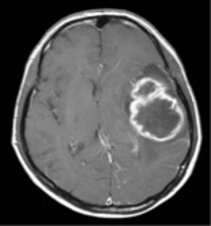Neuro-oncology
Brain tumorsNeuro-oncology is dealing with the diagnosis, treatment and post-operative care of patients with brain tumors. The Department of Neurosurgery has a designated neuro-oncology ward (Station Riechert) and the tumor consultation hours available for this purpose.
To give our patients with brain tumors optimal treatment, the Department of Neurosurgery is working closely together with other departments as the Department of Radiation Oncology and Hematology / Oncology. In addition to surgical treatment, we also offer various chemotherapeutic treatments on an outpatient or inpatient basis and the participation in clinical trials.
Considering the different treatment options and the participating departments, it is our mission to inform our patients about all diagnostic and therapeutic options and to coordinate all necessary steps to be taken.The consultation hours of the neuro-oncology department are focusing on patients with:
What is a glioma?
Gliomas develop from the supporting cells of the brain. These cells are called glial cells. The types of gliomas derive from these types of glial cells. Astrocytomas, oligodendrogliomas or ependymomas are belong to the group of gliomas. Astrocytomas are the most common tumors.
The most aggressive type of glioma is glioblastoma (glioblastoma multiforme). It grows rapidly and invades the surrounding healthy brain.
In terms of their histological structure and growth behavior gliomas are classified in 4 grades (WHO I-IV) by the World Health Organization WHO.
When and how frequently do gliomas occur?
Gliomas are the most common brain tumors. Frequency and age when gliomas may occur vary depending on the type of glioma. Overall, gliomas occur in 2-3 patients per 100.000 inhabitants.
What are the symptoms and health problems caused by a glioma?
Symptoms depend on the loacation in the brain. Typical are headaches, vomiting, seizures, paralysis (hemiplegia/hemiparesis), speech impairment, visual impairment and brain disorders such as memory or concentration problems, etc.
What are the treatment options?
For many gliomas a neurosurgical intervention is necessary, often supplemented by radiotherapy and chemotherapy. To prevent regrowth of the tumor, adjuvant treatment by chemotherapy and/or radiation therapy is performed.
What is a meningioma?
The brain is surrounded by the meninges, the membranes of the brain. Meningiomas may develop from this tissue. Most of these tumors are benign and usually slow-growing. Aggressive or fast-growing meningiomas occur only sporadically. In rare cases, a benign meningioma may change into a malignant one. Therefore, also meningiomas that do not require acute treatment, should be checked regularly. During pregnancy, meningioma growth may be accelerated. Therefore, during this time specific controls are recommended.
When and how frequently do meningiomas occur?
Meningiomas account for approximately 14-20% of all primary tumors that arise within the skull (intracranial tumors). They usually develop in middle age. In children, meningiomas are rare (about 3% of all brain tumors).
What are the symptoms and discomfort caused by a meningioma?
Meningiomas can grow long term without causing symptoms, they are often discovered by accident. The type of complaints depends on the location in the brain. Headache, vomiting, seizures, paralysis (hemiplegia/ hemiparesis) and limitations in visual acuity and brain function (cognitive limitation) are typical symptoms. What are the treatment options?Surgical removal is the treatment of choice. After the operation an additional radiation therapy can be useful in rapidly growing tumors or in the case of a tumor recurrence.
What are metastases?
If individual tumor cells from tumors of other organs (primary tumors) reach the brain via blood brain metastases may develop. The most common brain metastases arise from primary tumors in the lung or breast. Their biological properties are similar to those of the primary tumor. Brain tumors usually develop no metastases in other tissues or organs.
What are the symptoms and what discomfort may occur?
Whether and what symptoms occur depends, among other things, on the location, size and growth rate of the metastasis.The first symptoms are usually nonspecific, such as headaches, nausea, dizziness and/or circulatory problems. It may also be epileptic seizures, paralysis, impaired vision and aphasia.
What are the treatment options?
Brain metastases are treated by surgery, radiation and, rarely, chemotherapy.
Depending on the localisation of the tumor and the subtype specific treatments and surgical techniques are necessary. We therefore offer additional special consultation hours for the different types of tumors:
- Spinal tumors
- Skull base tumors (tumors in the skull)
- Pituitary tumors (pituitary gland)
- Tumors in children
- Hemangioblastomas and von Hippel-Lindau disease
